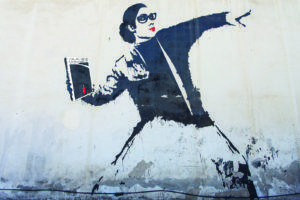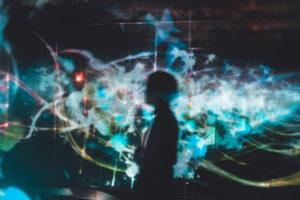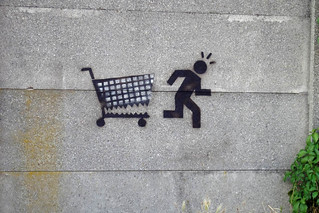 While doing some research, my partner got into a trove of old newspaper content. He idly tried searching family names and found an amazing number of mentions: birth announcements that listed every sibling’s name, meetings and election of officers of local organizations, a new job, the minor injury of a child (now in his seventies) in an accident. There was even a short article about a local man who was mentioned in a textbook my father wrote. Something important to an individual was considered worth sharing with the wider public.
While doing some research, my partner got into a trove of old newspaper content. He idly tried searching family names and found an amazing number of mentions: birth announcements that listed every sibling’s name, meetings and election of officers of local organizations, a new job, the minor injury of a child (now in his seventies) in an accident. There was even a short article about a local man who was mentioned in a textbook my father wrote. Something important to an individual was considered worth sharing with the wider public.
Category: tech & society
the bigot in the machine
 The New York Technical Services Librarians, an organization that has been active since 1923 – imagine all that has happened in tech services since 1923! – invited me to give a talk about bias in algorithms. They quickly got a recording up on their site and I am, more slowly, providing the transcript. Thanks for the invite and all the tech support, NYTSL!
The New York Technical Services Librarians, an organization that has been active since 1923 – imagine all that has happened in tech services since 1923! – invited me to give a talk about bias in algorithms. They quickly got a recording up on their site and I am, more slowly, providing the transcript. Thanks for the invite and all the tech support, NYTSL!
The Bigot in the Machine: Bias in Algorithmic Systems
Abstract: We are living in an “age of algorithms.” Vast quantities of information are collected, sorted, shared, combined, and acted on by proprietary black boxes. These systems use machine learning to build models and make predictions from data sets that may be out of date, incomplete, and biased. We will explore the ways bias creeps into information systems, take a look at how “big data,” artificial intelligence and machine learning often amplify bias unwittingly, and consider how these systems can be deliberately exploited by actors for whom bias is a feature, not a bug. Finally, we’ll discuss ways we can work with our communities to create a more fair and just information environment.
libraries and the practice of freedom in the age of algorithms
 I got to give a talk at ER&L about Project Information Literacy‘s latest study. Here’s the text.
I got to give a talk at ER&L about Project Information Literacy‘s latest study. Here’s the text.
Libraries and the Practice of Freedom in the Age of Algorithm
Abstract: How prepared are librarians, and the students they serve, to navigate technologies that are fundamentally changing how we encounter, evaluate, and create information? In the past decade, a handful of platforms have become powerful information intermediaries that help us search and connect but also are tools to foment disinformation, amplify hate, increase polarization, and compile details of our lives as raw material for persuasion and control. We no longer have to seek information; it seeks us. Project Information Literacy has revealed college students’ lived experience through a series of large-scale research studies. To cap a decade of findings, we conducted a qualitative study that asked students, and faculty who teach them, what they know and how they learn about our current information environment. This talk explores what students have taught us, where education falls short, why it matters, and how time-tested library values – privacy, equity, social responsibility, and education for democracy – can provide a blueprint for creating a socio-technical infrastructure that is more just and equitable in the age of algorithms.
Continue reading “libraries and the practice of freedom in the age of algorithms”
Odds & Beginnings
 I started to type “odds and ends” as a title for this post, and then had to make a pun. Forgive me, but this is my first post-IHE entry. It has been odd to not have a weekly deadline breathing down my neck, having been blogging for food since 2009. But it has also been freeing and I just have to get used to that freedom and use it for good. Here are some things I’m doing and reading.
I started to type “odds and ends” as a title for this post, and then had to make a pun. Forgive me, but this is my first post-IHE entry. It has been odd to not have a weekly deadline breathing down my neck, having been blogging for food since 2009. But it has also been freeing and I just have to get used to that freedom and use it for good. Here are some things I’m doing and reading.
So, this is happening – I get to go back to ER&L, a gathering of technically-inclined and savvy librarians in my long-ago stomping ground of Austin, Texas this March. I get to talk about the Project Information Literacy study I’ve been working on with researcher extraordinaire and PI Alison Head and Twitter maven and all-around-wordsmith-and-scholar Margy MacMillan. This is what I promised to talk about:
How prepared are librarians, and the students they serve, to navigate technologies that are fundamentally changing how we encounter, evaluate, and create information? In the past decade, a handful of platforms have become powerful information intermediaries that help us search and connect but also are tools to foment disinformation, amplify hate, increase polarization, and compile details of our lives as raw material for persuasion and control. We no longer have to seek information; it seeks us. Project Information Literacy has revealed college students’ lived experience through a series of large-scale research studies. To cap a decade of findings, we conducted a qualitative study that asked students, and faculty who teach them, what they know and how they learn about our current information environment. This talk explores what students have taught us, where education falls short, why it matters, and how time-tested library values – privacy, equity, social responsibility, and education for democracy – can provide a blueprint for creating a socio-technical infrastructure that is more just and equitable in the age of algorithms.
the Cassandra in me
 I had a long and interesting chat last week with my partner. He knows I’m a bit obsessive about privacy and the social consequences of Google, Facebook, YouTube, and the rest of the Silicon Valley marauders. But somehow we had never quite connected the dots to the rise of populism and the erosion of trust – particularly that classical propaganda move, throwing up enough disinformation that people don’t trust anything and simply give up, either putting their trust in a leader whose lies are their lodestar (because he proclaims everything else to be fake and the work of their enemies) or assuming they have no power because there’s no way to know the facts. My partner pointed out that in my “last” Inside Higher Ed post I talked about the last ten years but not what’s in front us. So he persuaded me to make one last post – something short to encapsulate the ideas we’d talked about. I’m reposting it here.
I had a long and interesting chat last week with my partner. He knows I’m a bit obsessive about privacy and the social consequences of Google, Facebook, YouTube, and the rest of the Silicon Valley marauders. But somehow we had never quite connected the dots to the rise of populism and the erosion of trust – particularly that classical propaganda move, throwing up enough disinformation that people don’t trust anything and simply give up, either putting their trust in a leader whose lies are their lodestar (because he proclaims everything else to be fake and the work of their enemies) or assuming they have no power because there’s no way to know the facts. My partner pointed out that in my “last” Inside Higher Ed post I talked about the last ten years but not what’s in front us. So he persuaded me to make one last post – something short to encapsulate the ideas we’d talked about. I’m reposting it here.
subject to change
 I was talking to my partner one evening last week when my phone died, midsentence. The apple symbol flashed a few times, then the screen went dark. Plugging it in didn’t help. All the usual resuscitation moves failed. I was phoneless, and it rattled me.
I was talking to my partner one evening last week when my phone died, midsentence. The apple symbol flashed a few times, then the screen went dark. Plugging it in didn’t help. All the usual resuscitation moves failed. I was phoneless, and it rattled me.
It’s discombobulating to have your phone stop working when you’re traveling. It would be disruptive at any time, really (it’s embarrassing to look at the charts showing how much time I spend staring at that little screen every day) but when I was away from home, it seemed especially disorienting. I am so used to figuring out where to go using Google’s map advice, finding the time I’m supposed to be somewhere by pulling up my email, keeping in touch with family by text message — even talking to people occasionally, though that’s rare. It was as if half my brain stopped working.
evidence and authority in the age of algorithms
(Presented at “Teaching Writing in a Post-Truth Era,” University of Notre Dame, August 20, 2019)
I come to the issue of teaching writing in the post-truth era from a somewhat different perspective than our previous speakers. I’m a librarian who has long been interested in the ways students get ideas, interact with other’s ideas, and how their experiences as writers in college shape their identity as people with agency and a grasp of how knowledge is made and negotiated by people – people like them. I’m taken with the parallels between writing instruction and what librarians do. Your writing program has as a goal ethical and moral use of words and evidence.
Making an argument is an ethical activity, one that helps students develop intellectual and moral virtues.
It’s about learning how words work and how to use those words ethically. This is also what information literacy is about. Learning is the primary purpose for librarians’ work with undergraduates. My library’s definition of information literacy is similarly ambitious – not just how to find and use information in the library and online, but more deeply to understand where information comes from, how it’s connected to social processes, and how they can participate in those processes with a clear sense of right and wrong.
Continue reading “evidence and authority in the age of algorithms”
information literacy’s third wave
 We’re developing a seven-week course that we proposed after a history professor urged the library to teach a course on fake news that everyone should have to take. We’re not using the fraught phrase “fake news” and we have no plans to force it on anyone, but it’s a great opportunity to think about what we mean when we say “information literacy.” Students think librarians know stuff about libraries, which is where you go to find information for school. We actually know stuff about information systems that are not mediated by libraries and information literacy is more than finding sources for assignments. This course will focus on information that we encounter through various channels, how those channels work, how to quickly verify a doubtful claim and (to use Peter Elbow’s phrase) how to play the believing game as well. As Mike Caulfield has demonstrated, students don’t need to learn skepticism as much as they need to learn when to trust. We’ll see how it goes.
We’re developing a seven-week course that we proposed after a history professor urged the library to teach a course on fake news that everyone should have to take. We’re not using the fraught phrase “fake news” and we have no plans to force it on anyone, but it’s a great opportunity to think about what we mean when we say “information literacy.” Students think librarians know stuff about libraries, which is where you go to find information for school. We actually know stuff about information systems that are not mediated by libraries and information literacy is more than finding sources for assignments. This course will focus on information that we encounter through various channels, how those channels work, how to quickly verify a doubtful claim and (to use Peter Elbow’s phrase) how to play the believing game as well. As Mike Caulfield has demonstrated, students don’t need to learn skepticism as much as they need to learn when to trust. We’ll see how it goes.
another tech is possible
 I submitted this piece to the Minneapolis Star Tribune, which published it under the headline “Freedom of information and personal data: Big Tech should take cues from public libraries” and the deck “They’ve developed a robust set of core values that strike the right balance.” You nailed it, Strib!
I submitted this piece to the Minneapolis Star Tribune, which published it under the headline “Freedom of information and personal data: Big Tech should take cues from public libraries” and the deck “They’ve developed a robust set of core values that strike the right balance.” You nailed it, Strib!
By the end of 2018, whatever faith we may have once placed in the giant technology corporations that we use daily was growing threadbare. YouTube made a show of removing Alex Jones’ breathless conspiracy theories for repeatedly violating their guidelines, but a subsequent report from Data and Society showed the platform continues to promote extremist content through its sensation-seeking algorithm. Amazon has rolled out a powerful facial recognition system, but it is flawed and biased, according to the ACLU, which found it falsely matched members of Congress with criminal mug shots. Facebook was apologetic about personal information scooped up by Cambridge Analytica and claimed it was a one-off violation of policies. Then we found out, thanks to a December New York Times investigation, that Facebook has given over a hundred companies routine access to troves of users’ personal data.
can’t argue with that
 It seems as if Charlottesville was several years ago. It was a shock, seeing Nazis and white supremacists carrying torches on the campus of the University of Virginia campus, then invading the town carrying guns and the kind of gear that you’d think belonged to an angry offshoot of the Society for Creative Anachronism, unleashing threats, violence, beatings, and even murder. There was outrage, but since then there has been a strange drift toward accepting white supremacy. It’s fueling candidates for office. It shows up on talk shows where hosts say America won’t be America if we don’t get rid of immigrants.
It seems as if Charlottesville was several years ago. It was a shock, seeing Nazis and white supremacists carrying torches on the campus of the University of Virginia campus, then invading the town carrying guns and the kind of gear that you’d think belonged to an angry offshoot of the Society for Creative Anachronism, unleashing threats, violence, beatings, and even murder. There was outrage, but since then there has been a strange drift toward accepting white supremacy. It’s fueling candidates for office. It shows up on talk shows where hosts say America won’t be America if we don’t get rid of immigrants.
This is nothing new. What’s new, I think, is the way in which social media and journalism are trying to negotiate new forms of expression and argument in the midst of the vast and immediate distribution of text, images, and video through new channels. I’m trying to figure out how to help students understand the information they encounter, and our usual discussions of evaluation of sources simply doesn’t apply without a broader grasp of the sociotechnical moment we’re in. Understanding events like Charlottesville and the hate-inspired violence that keeps happening is likewise impossible without understanding the ways information outside the library flows. Continue reading “can’t argue with that”